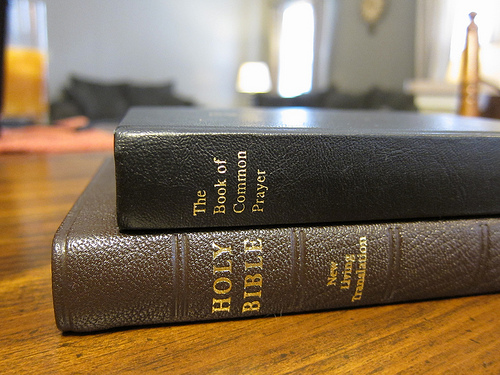Beliefs
 As an Episcopal/Anglican congregation, Piedmont affirms the beliefs of the historic, worldwide Christian Church. We don’t claim any distinctive theology, but hold to what has been believed by Christians from the beginning, by “everywhere, always and by all.” British author C.S. Lewis described Anglican belief as “mere Christianity,” and Episcopal priest Fleming Rutledge described it as offering a “generous orthodoxy.” Specifically, we affirm the following:
As an Episcopal/Anglican congregation, Piedmont affirms the beliefs of the historic, worldwide Christian Church. We don’t claim any distinctive theology, but hold to what has been believed by Christians from the beginning, by “everywhere, always and by all.” British author C.S. Lewis described Anglican belief as “mere Christianity,” and Episcopal priest Fleming Rutledge described it as offering a “generous orthodoxy.” Specifically, we affirm the following:
HOLY SCRIPTURE
With other Christians, we believe that God fully, finally and perfectly revealed himself in Jesus Christ and that the Holy Scriptures are a trustworthy record of that revelation, the “Word of God written.” We hold the Scriptures, the Old and New Testament, to be “the rule and ultimate standard of faith,” the defining Story of humanity and of the world.
CREEDS
We affirm—and profess publicly each week—the historic creeds—statements from the EarlyChurch which are grounded and rooted in the Holy Scriptures:
STATEMENTS OF FAITH
More detailed definitions of how our church has understood “the faith that has been handed down to us” can be found in:
The Articles of Religion (Church of England Statement, 1571, adopted by the Episcopal Church, 1801)
Outline of the Faith, or Catechism (Episcopal Book of Common Prayer, 1979)
AS WE WORSHIP, SO WE BELIEVE
The ancient Church Fathers said, “as we worship, so shall we believe.” If you truly want to know what we believe, it is not enough to simply consider our formal statements of faith, what we say we believe. Better is to look at how we worship. Read our Prayer Book, pray our prayers, reflect on the service of baptism, note the opening address for the service of Holy Matrimony, meditate on the Holy Communion prayers—you can't help but be confronted with direct, powerful claims about who God is, about what is true and what is real, and how we are expected to live. Here, in our corporate worship is our living profession of faith.



